How to Prepare for Medical School Entrance Exams in Bulgaria

So, it’s your final year in high school, and you’ve decided you want to study medicine in Bulgaria. You’re excited and hopeful but also… equally nervous. Who can blame you? Not only do you have graduation on your mind, but you need to prepare for your medical school entrance exams. We all know how stressful and scary those can be.
Luckily, in this article, we’ll tell you everything you need to know to pass your Bulgarian medical school entrance exams with flying colours. From study strategies to test-taking practices, we’ll make sure you can succeed in your examinations and move one step closer to achieving your goals.
Table of Contents
What are medicine entrance exams like in Bulgaria?


Currently, 6 universities in Bulgaria offer medicine in English. Naturally, the entrance exams differ slightly for each of them, but at their core, they evaluate for the same subjects: your knowledge in Biology, Chemistry, and, in some cases, an English proficiency test. Another variable is whether the test is online or if you have to be physically present while taking the exam.
There is, however, one thing that all of them have in common - they have a section with the fan favourite: multiple-choice questions (MCQs). They’re always put at the start so exam-takers can warm up for the more difficult parts. Apart from multiple choice, there are 4 other types of questions that you will encounter:
- Fill the gaps - You are given a sentence with omitted words that you need to fill in.
- Match the terms in pairs—You are given two columns of terms that are out of order and need to be matched with their pairs.
- True or False - You are given statements and have to decide whether they are true or false.
- Open questions - You are given questions that require you to write a more detailed answer.
While some universities combine only two or three of these question types, others, like the Medical University of Varna, choose to use all 5 of them. We guarantee that being prepared to answer various questions will prove very advantageous when taking your exams. If you’re curious to see how prepared you are currently, we’ve prepared a surprise mini-exam in the third section of this blog post, where you can test your knowledge while getting a taste of what your exam could look like.
Fill in this form if you want a free consultation about applying to med schools in Bulgaria and a full guidance to pass the entrance exam and getting accepted:
Check your email to Book a FREE call
with an expert advisor
Look at your promotions/spam folders, just in case.
How to study for medical school entrance exams in Bulgaria?


Overall, success in medical school entrance exams in Bulgaria requires hard work, dedication, and intelligent study strategies. Fortunately for you, our experts at Medlink Students have prepared a full-proof checklist to help you prepare for your respective examinations. If you want to be extra-prepared, read our blog post on preparing for your studies in Europe.
Understand the format and content of the exam:
Research the specific exam that you will be taking and understand the content and format. Not only will it help you approach your preparation in a more focused and efficient manner, but you will also be prepared for the different types of questions that will appear on your exam.
Create a study plan:
Develop a study plan that includes daily goals and a timeline for covering all the necessary material. Make sure to give yourself sufficient time for each subject area and make use of practice tests.
Focus on core subjects:
The exam will cover core subjects such as Biology, Chemistry, and English proficiency. Focus on these subjects and make sure you have a good grasp of the fundamental concepts.
Use high-quality study materials:
Invest in factual and informative study materials, such as textbooks, practice exams, and online resources. Consider using study guides and notes from previous students who have taken the exam. Part of what Medlink Students can assist you with is providing high-quality preparation resources. If you want to instantly get access to all the materials you’ll need, contact us, and we’ll provide everything once you sign up with us.
Work with tutors or attend preparatory courses:
Consider working with a tutor or attending preparatory courses to supplement your self-study. These resources can prove very valuable. Medlink Students has a Medicine Foundation Courses Europe that will significantly increase your chance of getting into your desired university.
Practise time management:
The exam will be timed, so it’s essential to practise time management. Take practice exams and work on your pacing to ensure you can answer all the questions within the given time limit.
Stay motivated and maintain good study habits:
Studying for medical school entrance exams can be a long and challenging process. Stay motivated and maintain good study habits, such as getting enough sleep, eating well, and taking breaks when needed. You can read our 4 tips on developing strong study habits and 17 tips to get motivated to study.
By following this list and using proper planning, hard work, and dedication, we are confident that you will pass your exams and take your first step to become a medical professional.


Medical school entrance exam sample questions
As promised, it’s exam time! Please feel free to take a shot at the questions. To keep it interesting, set a timer for 20 minutes for each subject and see how you handle the added pressure. You can find the answers at the very end of the blog post. There is a mini-exam that has been prepared with resources from the Medical University of Varna. You can download it below:
How did you do? Be sure to share your results in the comments! If you want to truly test your skills, follow each of these links for a whole sample test, courtesy of Varna MU:
Biology medical university entrance exam.
Chemistry sample entrance exam.
Reserve Your Spot for Our Webinar
When are the entrance exams in Bulgaria?


The dates for entrance exams in Bulgaria can vary from year to year, so we’ve compiled precise approximations depending on which of the 6 universities you’re applying to and when the academic year starts. Predominantly, students start their year in October, with MU Pleven and MU Trakia being the exceptions. For MU Trakia students, the semester starts at the end of September, while those studying in Pleven start in February.
We’ve saved you the hassle and have prepared a list so you can see when each of these universities holds its entrance exams. This year, all of the assessments will be taken online. Here’s our list:
- For EU + EEA students: the exams are taken in mid-September
- For non-EU + EEA students: the exams are taken at the beginning of October
MU “St. Kliment Ohridski” in Sofia:
- There are two exam dates: early September and mid-September
MU Varna gives several opportunities for students to take the exams:
- Beginning of April
- Mid-May
- Mid-June
- End of July
- Beginning of September
Trakia University in Stara Zagora has three sessions:
- Beginning of June
- End of July
- End of August
MU Pleven offers two dates for students to take exams:
- Mid-September
- Mid-November
MU Plovdiv also gives several opportunities for students to attempt their entrance exams:
- End of April
- Mid-May
- Mid-June
- Mid-July
- As well as a retake in mid-July and at the end of August
If you want to learn a bit more about MU Plovdiv, we’ve got a great review by a UK student on it.
Conclusion
We are certain that you’re much more informed and fired up to get started with your preparations for your respective medical school entry exams in Bulgaria. Remember, the key is persistence, hard work, and a good study plan.
Here at Medlink Students, we specialise in helping students get into the university of their dreams. Not only do we handle the confusing paperwork involved with admission, but we also give you a detailed study plan, along with all the materials needed, study guides, and all the topics you need to cover to ace your exams.
If you’re ready to take your first step and want to learn more about studying medicine in Bulgaria, let’s schedule a call with our experts at Medlink Students. It’s completely free and takes no more than a minute. We’ll tell you everything you need to know to start living your dream of becoming a medical professional.


Biology mini-exam answers:
- Multiple choice:
1. B
2. B - Fill the gaps:
1. voluntary, involuntary, actin, myosin
2. small, large, rRNA, proteins - Match the terms:
1st set: 1. C, 2. E, 3. A, 4. B, 5. D
2nd set: 1. B, 2. C, 3. D, 4. E, 5. A - True false:
1. False
2. True - Open questions:
1. Define the term protein.
List the levels of protein structural hierarchy.
Briefly describe the structure and the folding pattern of each level.
2. Define the term “numerical mutation”.
List the human numerical mutations you know.
Write down the karyotype of each numerical mutation (the typical
human karyotype is 46,XX or 46,XY).
Chemistry mini-exam answers:
- Multiple choice:
1. A
2. C - Fill the gaps:
1. peptide, amide, water, secondary
2. concentration, v=k.Cn(A). Cm(B), higher, increase - Match the terms:
1st set: 1. E, 2. C, 3. B, 4. D, 5. A
2nd set: 1. E, 2. C, 3. B, 4. A, 5. D - True false:
1. False
2. True
Open questions:
1. electrolytic dissociation - a process when the individual components of a substance placed into a solvent dissociate due to the thermodynamic interactions between solvent and solute molecules. For example, when table salt, NaCl, is placed in water, the salt (a solid) dissolves into its component ions, according to a dissociation reaction.
NaCl → Na+ + Cl–
Electrolytes break up into cations (positively charged ions) and anions (negatively charged ions). Strong electrolytes ionise completely (100%), while weak electrolytes ionise only partially (usually in the order of 1–10%).
Strong electrolyte: NaOH → Na+ + OH–
Weak electrolyte: NH4OH ⇌ NH4+ + OH–
2. The esterification reaction is a slow and reversible process between alcohols and oxygen-containing acids. The products of the reaction are called esters. Chemical conditions include heat and catalyst – usually H+ from concentrated sulphuric acid. The equation for the reaction between an acid RCOOH and an alcohol R″OH (where R and R″ can be the same or different) is:


For example, if you were making ethyl ethanoate from ethanoic acid and ethanol, the equation would be


Leave a Reply

About Medlink Students
Leading international recruitment company for medical students in Europe. British Council Certified Agents. 10+ years of experience and more than 10,000 students advised.








